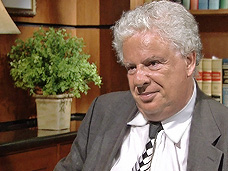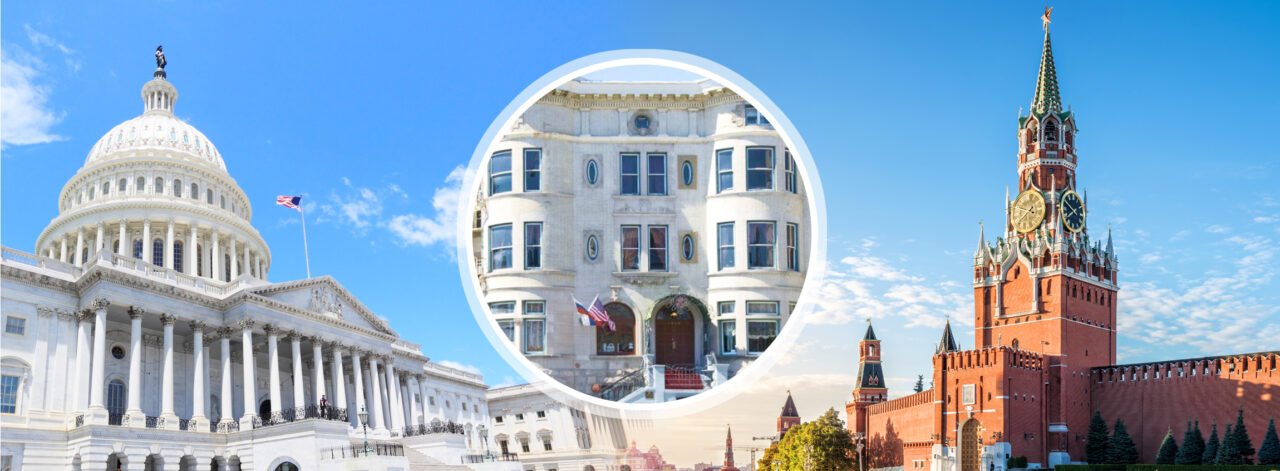
Martin Sieff
Martin Sieff is a Senior Fellow of the American University in Moscow and former Managing Editor, International Affairs at United Press International. He is the author of Cycles of Change: The Three Great Cycles of American History and the Coming Crises That Will Lead to the Fourth (2015) available from www.martinsieff.com
December 31, 2016
US President-elect Donald Trump can be taken at his word about his sincerity in wanting to restore good relations with Russia: He is certain to find welcome potential partners in Moscow; but his greatest difficulties with implementing such a policy will be in Washington, DC.
Realist Trump
Through his long election campaign, Trump has been far more detailed and consistent about this aspect of his foreign policy than his many media critics have given him credit for.
Far from being naïve about the Russian government and Russian policies, he has repeatedly made clear he is looking to revive and build upon the kind of incipient partnership that US Presidents Ronald Reagan and George Herbert Walker Bush started to establish with the last Soviet President Mikhail Gorbachev in the 1980s.
Trump is preparing to take office with a clear global strategic vision that is not dependent on detente with Russia but that would be greatly aided by it.
No more democracy-building
He believes that the United States has bankrupted itself and strategically overextended and exhausted its armed forces in 15 years of wars and (failed) nation-building efforts across the Middle East since the pivotal terror attacks of 9/11.
Trump also believes, as he made clear in his keynote foreign policy address at the Mayflower Hotel in Washington in April 2016 that the greatest danger facing the entire world and the United States in particular is that of nuclear war with Russia.
This is by no means an exaggerated, ridiculous or irresponsible position to hold. The Bulletin of the Atomic Scientists has its famous Doomsday Clock currently set at only three minutes to midnight – the same setting it held during the 1962 Cuban Missile Crisis.
Bad relations with Russia under Obama
During Barack Obama’s two terms as President of the United States, relations between the United States and Russia – still the two dominant and definitive thermonuclear powers of the planet – have plunged to levels of vituperation and bitterness far worse than during the famous "last freeze” of the Cold War, when Ronald Reagan confronted Soviet President Yuri Andropov from 1982 to 1984.
Pragmatic Tillerson
Trump’s selection of Exxon Mobil CEO Rex Tillerson as his secretary of state is highly significant for many reasons. Not the least of them is that Tillerson, in his career as one of the world’s most successful and powerful oil executives, has had an unrivalled experience of successful deal-making and cooperation with the Russian government and the country’s main energy companies.
Also, Tillerson marks a reversion to the traditional classic pattern of US secretaries of state going back to Hamilton Fish, Ulysses S. Grant’s outstanding chief diplomat after the US Civil war 150 years ago.
Tillerson is a throwback to pragmatic, business-oriented and practical secretaries of state who either have been powerful business executives or high powered lawyers.
The most recent examples of secretaries from these backgrounds were George W. Schultz, who had run the gigantic Bechtel (privately held) engineering and construction corporation and his successor, James A. Baker III in the 1980s.
In the Schultz-Baker mold
Tillerson fits into the Schultz-Baker mold: In 2011, he negotiated an agreement with the Russian state oil company Rosneft for drilling rights in the Russian Arctic long with projects in the Black Sea valued up to $300 billion. A year later, in 2012, he was decorated with the Order of Friendship, an honor awarded to foreign nationals for efforts to improve relations with Russia.
Former Clinton-era deputy defense secretary John Hamre has said Tillerson has had more interactive time with Russian President Vladimir Putin than probably any other American except Henry Kissinger. This should be seen as a qualification for the job, not an impediment to holding it.
Tillerson’s pick also made clear that Trump is determined to end the succession of secretaries of state who were determined to advance democracy and human rights around the world and to destabilize or topple outright recalcitrant regimes as their primary mission, like Madeleine Albright and Hillary Clinton.
The results of such policies under the last three US presidents have certainly been dire.
End the influence of the neo-cons
Trump has also made manifest his contempt for the current traditional culture of the State Department.
Since the collapse of communism and under Presidents George W. Bush and Obama in particular, the State department internal culture has degenerated into a passion for nation building and judging the world according to American-only standards of human rights and behavior.
In this climate, the State Department and its diplomats have abandoned their traditional focus on bilateral relations with a focus on the promotion of US national security and economic interests that were the traditional concerns of American diplomacy.
Therefore in choosing Tillerson, Trump also deliberately reached out to pick a "vicar” or chief coordinator and guide, to US foreign policy who was not from within the State Department’s own internal culture, which has become increasingly dominated by neoconservative ideology in recent decades.
Indeed, it appears likely that Trump will want Tillerson to go far beyond restoring the basic protocols of amity and politeness between the U.S. and Russia –the world’s dominant thermonuclear superpowers– and seek to expand their cooperation across a wide spectrum of economic and national security interests.
Major challenges ahead
However, that will be far easier said than done.
First, the Russians will certainly demand that Trump pulls US military forces and those of the NATO alliance back from their unprecedented forward deployments in the three Baltic States of Estonia, Latvia and Lithuania – all now NATO members thanks to George W. Bush, as well as from Ukraine and Georgia.
The Russians have experienced more than a quarter century of steady NATO and US-led encroachment on their traditional areas of influence and security buffer zones in Central and Eastern Europe. The US and European Union–backed violent coup in Ukraine in 2014 was from Moscow’s point of view the final straw.
To this day, the American public, senior US government policymakers and virtually the entire Congress fail to recognize how alarmed and even disgusted the Russians were by the events of February 2014.
Ukraine from a Russian perspective
They witnessed the violent overthrow of a democratically-elected and hitherto stable government in Kiev and its replacement by a violent, irresponsible regime under which economic and security cohesion in Ukraine have disintegrated.
Second, until the Ukraine crisis erupted in February 2014, Russia kept its distance from the Islamic Republic of Iran and refused to sell Tehran the state of the art anti-aircraft missile systems and nuclear technology it craved. All this restraint vanished after the Maidan revolution of 2014 in Kiev.
Consequently Trump and his diplomats will face a Russia that is now more closely tied to Iran as well as Syria than it has ever been.
The Iran deal
Therefore if Trump pushes ahead with his determination to revoke the controversial Five plus One nuclear deal negotiated by Secretary of State John Kerry and his colleagues with Iran, he will face furious opposition from Russia.
Trump and Tillerson will also face fierce challenges from a wide range of forces in Washington who have come to regard reflexive hostility to Russia as the natural order of things far more than it ever was against the Soviet Union during the decades of the Cold War.
Trump has repeatedly said that the ongoing civil war in Ukraine since the democratically elected government of President Viktor Yanukovych was toppled in a violent 2014 coup was peripheral to US interests.
U.S. military leaders have an anti-Russia bias
However, that position is anathema to the hawkish top commanders of the US military.
Chief of the Joint Chiefs of Staff General Joseph Dunford and former NATO Supreme Commander and ex-head of US European Command (EUCOM) Air Force General Philip Breedlove have both repeatedly testified to Congress that the United States must protect Ukraine against Russia.
Breedlove has even referred to the government and armed forces of Ukraine under chocolate billionaire President Peter Poroshenko as "Our Ukrainian brothers.”
With US President Barack Obama’s support, NATO in 2016 carried out its largest ever military exercises across Eastern Europe involving 23,000 troops. The NATO summit in Warsaw in July also approved further moves to expand US military support to nations throughout Eastern Europe.
Anti-Russian hawks in Congress
The hawks in the US armed forces are backed by a dominant bipartisan coalition on Capitol Hill led by anti-Russian senators John McCain and Lindsay Graham, both of whom have been unsuccessful presidential candidates.
They are joined by liberal Democrats such as Senator Ben Cardin who are committed to imposing US standards of human rights and democracy on countries around the world.
Trump can expect fierce opposition from all these forces in his efforts to improve relations with Russia and if he makes any move to reduce US military forces and commitments to NATO and deployments in Eastern Europe.
Guarantees to an expanded NATO?
It also remains unclear if Trump will maintain the commitment of the United States to the support of the three Baltic States of Latvia, Lithuania and Estonia that President George W. Bush insisted on bringing into NATO.
The governments of Poland, the Baltic States, Ukraine and Georgia are certain to make common cause with neoconservative and liberal interventionist forces that dominate the US Senate and the Washington foreign policymaking community to fight Trump’s efforts to improve relations with Moscow at every turn.
After Obama took office in 2009, his first secretary of state Hillary Clinton, whom Trump defeated in the November 8 election, proclaimed a "reset” of US policy with Russia but failed to back it up with any practical measures.
Even the plastic red "reset” button she gave to Russian Foreign Minister Sergei Lavrov was made in China and jammed.
The policymaking dynamics within the incoming Trump administration also remain uncertain.
Can Trump-Tillerson remake U.S. foreign policy?
Tillerson is used to working with a united top leadership at Exxon Mobil but he may face fierce resistance to his anticipated pro-Russia policies led by retired Marine General James "Mad Dog” Mattis, Trump’s choice as secretary of defense and Lieutenant General Michael Flynn, the former head of the Defense Intelligence Agency who is his choice as national security adviser.
Trump looks likely to find willing would-be partners in Moscow for the constructive initiatives he has suggested. But first he and Tillerson will have defeat their many critics and political enemies in Washington.



_jpg/250px-ElbeDay1945_(NARA_ww2-121).jpg)







